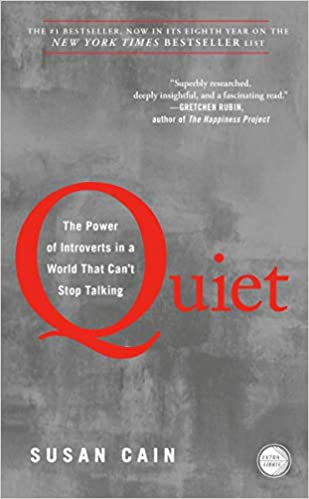The thought of public speaking can be terrifying. Even the idea of it can cause us to clam up with nerves, yet it is something that many people are called on to do at work regularly.
The good news is that it does get easier with practice, and even though you may be part of the 75% of the population with glossophobia (like the fear of public speaking is called), once you have done it, you may find that you get to enjoy it!
If this sounds familiar to you, check out our step-by-step guide to overcoming the fear of public speaking.

Quiet
by Susan Cain
⏱ 13 minutes reading time
🎧 Audio version available
Know Your Subject
Preparation is vital, and the more you know about your subject, the easier it will be. If you get lost along the course of your presentation, knowing the subject will help you recover quickly.
Make Sure You Are Organized
If you have props or visual aids, make sure they are ready to display and that you are comfortable with the technology. Practice makes perfect, so running through your talk beforehand will help. It is also a good idea to write out a plan for the conversation so that you can remember the running order if nerves kick in.
Try Out Your Speech On Other People
Once you have practiced alone, it is good to try it out on other people you feel comfortable with. Ask for feedback and act on it if appropriate.
You can try videoing yourself, too, to iron out any nervous tics and to see where you can improve the presentation. Doing this can feel intimidating, but you might be surprised at just how “normal “and engaging you can be!
What Is The Worst That Could Happen
Remember, 75% of people fear public speaking, so the fact that you are doing it at all already makes you a winner. Focus on any specific concerns you may have, and you will probably realize that they are relatively minimal compared with real-life issues and situations.
Don’t Try To Memorise Your Speech Word For Word
If you do this and forget your script, it could leave you in panic, and in addition, it will make your writing seem dry and stilted. Instead, write down a list of points in your plan that you need to cover in your speech and work through them one at a time.
It is absolutely fine to refer to your notes. You are making a speech in front of work colleagues and friends, not playing the lead role in Hamlet!
Focus On The Content And Don’t Worry About The Nerves
If your speech contains interesting, new information, your audience will listen and engage with you even though nervous. Displaying nerves is perfectly human, and your audience understands how scary public speaking can be, so nobody will judge you badly if you seem nervous.
Deep Breathing Exercises Help
Before you get up to speak, do some deep breathing exercises to calm the physical effects of nerves. Remember that many well-known performers get stage fright before they perform. However, once you start, you will probably find that adrenaline kicks in and sharpens your performance. You are a winner! You can do this!
Don’t Be Scared By Silence
When we are under stress, a few seconds of silence can seem like an eternity, but for your audience, it may be unnoticeable. So again, stick to your plan and work through your points, and everything should go fine.
Engage With Your Audience
It can be hard work keeping a monologue going, so making your talk more interactive with questions and answers is more entertaining for the audience and easier for you. But, again, planning and trying out your presentation in front of a few people in advance should boost your confidence.
Eye Contact Is Important
Many people worry about where to look. Do you make eye contact with anyone? Should you direct your gaze over the audience’s head?
The best thing to do is to introduce yourself in advance to a few audience members and look these people in the eye until you have settled your nerves and gotten into the flow of your talk. Alternatively, in front of work colleagues, focus on friends until you feel more comfortable.
What If It All Goes Right
Your speech probably will go well if you plan and focus on creating exciting content. Imagine how you will feel once your speech is over and it has been successful. Visualize the success rather than any potential failure, and it will help create a more successful mindset.
Reward Yourself
Once you have completed your speech, congratulate yourself! Yes, you may have messed up a couple of times, and maybe not everything went in the way you hoped, but you did it.
Public speaking is not easy, and the fact that you have done it at all is a reason to congratulate yourself. Promise yourself a treat, such as a meal out or a celebratory drink, afterward and focus on that. It will help to calm your pre-speech nerves.
What Is Snapreads?

With the Snapreads app, you get the key insights from the best nonfiction books in minutes, not hours or days. Our experts transform these books into quick, memorable, easy-to-understand insights you can read when you have the time or listen to them on the go.


